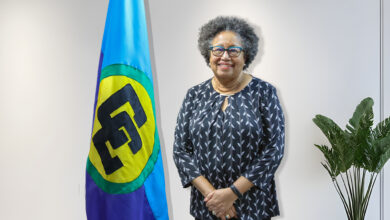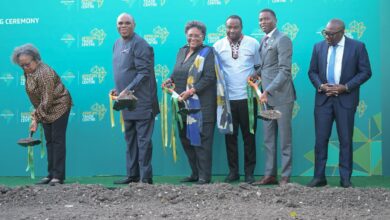- Honourable Ministers;
- Honourable Wendy Morton MP, Parliamentary Under Secretary of State for European Neighbourhood and the Americas, and Representative of the COP26 Presidency;
- Mr. Moderator, Dr. Colin Young Executive Director of the Caribbean Community Climate Change Centre;
- Your Excellency Aubrey Webson, Permanent Representative of Antigua and Barbuda to the United Nations, and Representative of the Chair of AOSIS;
- Representatives of Regional Institutions;
- Representatives of the Caribbean Environmental Youth Network.
As the Region makes its final push to consolidate its common positions and priorities for COP26, today’s meeting marks the culmination of several months of preparation by our Community. The first Coordination Meeting was held in May this year, followed by the first Ministerial Preparatory Meeting in July and the Ministerial Workshop on Article 6 held in early September. There were also two Meetings of the Council for Foreign and Community Relations that received briefings and provided guidance.
Our discussions have been taking place amidst a hectic schedule of international preparatory meetings which saw active participation by CARICOM. This iterative process allowed us to crystallise the Region’s priorities and positions, which have been collated into the Ministerial Brief that has been submitted to Member States.
Under the guidance of CARICOM lead negotiators in the key thematic areas, a CARICOM Ministerial Declaration was prepared to layout the Region’s main expectations for a successful outcome to COP26. This is on the table before Ministers for adoption at today’s meeting.
In addition, the Heads of Government met in a Special Meeting dedicated to COP26 last Monday and agreed with the positions that have been articulated so far and requested that going forward, we ensure a strategic, nuanced approach on carbon markets, that we pay particular to our participation in carbon markets – whether the source is in the forests or the oceans. This is an area that will require the relevant regional institutions to work with specialists in our member states.
Honourable Ministers, I am sure you will agree with me, when I express sincere thanks for the sustained and continued engagement of our team and the outreach by the UK Government in the approach to COP26. This continues today, as we welcome Honourable Wendy Morton, the UK Parliamentary Under-Secretary of State for European Neighbourhood and the Americas and Representative of the COP26 Presidency.
In addition to reaching out individually to Member States, the UK Government has partnered with the Community to hold a number of High-Level Ministerial engagements, as well as sessions with other stakeholders.
These engagements placed sharp focus on the common priorities for CARICOM and the COP Presidency,and underscored the strong partnership of the UK Government with the Region. We welcome their pledge to amplify the voices for Small Island Developing States (SIDS), and the opportunities provided to share our concerns. It is our sincere hope that the recommendations and solutions provided by SIDS find their way into the outcomes of the COP.
Let me also warmly thank and congratulate Dr. Colin Young and his team at the Caribbean Community Climate Change Centre (CCCCC), for their hard work in leading the Region’s preparation i to participate effectively in Glasgow.
As we continue to prepare for this crucial COP 26, we must do so fully aware of the need for collective action to support adaptation and mitigation at the national, regional and international levels. We have overwhelming evidence from various IPCC Reports of the particular threat that uncontrolled temperature rise will have on SIDS.
We remain concerned about the level of ambition in submitted Nationally Determined Contributions (NDCS). There is the urgent need to close the emissions gap to maintain global warming to well below 1.5⁰C. For the region it is critical that COP 26 calls for new NDCs with 2030 targets that are consistent with the 1.5⁰C temperature goal and credible net zero by 2050 long-term strategies before the global stocktake in 2023.
The Region recognises that to enable the highest possible ambition so as to maintain global warming to well below 1.5⁰C and to keep all Paris goals within reach, Parties must complete the Paris Rulebook that strengthens accountability, enables ambition and preserves key principles of transparency and environmental integrity.
As we demonstrated at our Ministerial discussion on Nature Based Solutions, many of the remedies require international political will and broad consensus in key institutions to address the impacts of these issues on SIDS.
Multilateral bodies will need to deliver on the various commitments made to address SIDS problems, recognising their position as a special case for sustainable development and one of the groups of states in special situations.
Chair, COP 26 is not an end in itself. Even if we are successful in getting what we ask for especially as it relates to financing for adaptation and loss and damage and agreement on increasing contributions to the Green Climate Fund, we have to put ourselves in a position to capitalise on any successes.
I therefore invite you to not look at today’s meeting as the end of preparation for COP26, but rather as a renewal of commitment for an ongoing regional effort to harness our capacities, leverage our collective strengths, and, most importantly, to take participatory and coordinated approaches to tackling the impacts of global climate change that is so detrimental to our Region.
I look forward to today’s deliberations and wish us all a very successful Meeting.






